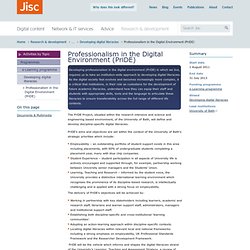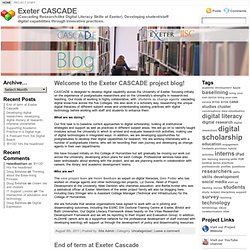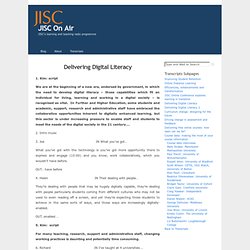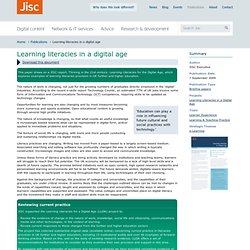

DIAL: Digital Integration into Arts Learning. Professionalism in the Digital Environment (PriDE) Developing professionalism in the digital environment (PriDE) in which we live, requires us to take an institution-wide approach to developing digital literacies.

As the digital society fast evolves and becomes increasingly more complex, it is critical that institutions, in their role as custodians for the development of future academic literacies, understand how they can equip their staff and students with appropriate skills, tools and the language to articulate these literacies to ensure transferability across the full range of different life contexts. The PriDE Project, situated within the research intensive and science and engineering based environment, of the University of Bath, will define and develop discipline-specific digital literacies.
PriDE’s aims and objectives are set within the context of the University of Bath’s strategic priorities which include: The delivery of PriDE’s objectives will be achieved by: Objectives.
LLiDA. Exeter CASCADE. Here at the Exeter Uni’s Teaching and Learning Conference, Helen and I set up a stall for the Exeter CASCADE project, which got a lot of traffic.

First of all, let me explain why we stood out from the crowd. Every other stall looked like this: And our stall looked like this: So besides my excitement about wearing my favorite Hawaiian dress, what else happened? We talked to a lot of people, and a big rang of people too. We asked people to fill in papers and leave them in a bottle, a ‘message in a bottle’ responding to the statement ”Help! Like our conversations, the responses on our wall wiki and our bottle brought out a lot of the contentious nature of the whole ‘digital literacy’ thing. ‘Help! Because people’s relationships with technology are different, and because people are different, I guess it makes sense that people would have some different answers to that statement.
Preparing for a digital future. Delivering Digital Literacy at JISC On Air. 1.

Kim: script We are at the beginning of a new era, endorsed by government, in which the need to develop digital literacy – those capabilities which fit an individual for living, learning and working in a digital society – is recognised as vital. In Further and Higher Education, some students and academic, support, research and administrative staff have embraced the collaborative opportunities inherent to digitally enhanced learning, but this sector is under increasing pressure to enable staff and students to meet the needs of the digital society in the 21 century.… 2. 3.
What you’ve got with the technology is you’ve got more opportunity there to express and engage (10:00) and you know, work collaboratively, which you wouldn’t have before. OUT… have before 4. OUT…enabled … 5. For many teaching, research, support and administrative staff, changing working practices is daunting and potentially time consuming. 6. OUT … address that 7. 8.
OUT…teaching them 9. Hello and welcome to Jisc on Air. Learning literacies in a digital age. Download this document1 This paper draws on a JISC report, Thriving in the 21st century: Learning Literacies for the Digital Age, which explores examples of learning literacies provision in UK further and higher education.

The nature of work is changing, not just for the growing numbers of graduates directly employed in the ‘digital’ industries. According to the recent e-skills report ‘Technology Counts’, an estimated 77% of UK jobs involve some form of Information and Communications Technology (ICT) competence, requiring skills to be updated as technology changes. ‘Education can play a role in influencing future cultural and social practices with technology.’Opportunities for learning are also changing and by most measures becoming more numerous and openly available. Open educational content is growing through several high profile initiatives.
The texture of social life is changing, with more and more people conducting and sustaining relationships via digital media. The Never Ending Thesis. Education & Training: Digital Literacy. Developing digital literacies. Overview Many learners enter further and higher education lacking the skills needed to apply digital technologies to education. As 90% of new jobs will require excellent digital skills, improving digital literacy is an essential component of developing employable graduates. Courses that embed core digital skills, as well as subject specific use of technology, enable students to gain the skills and confidence they need to use digital technology not only to support their learning but also in the workplace. We’re working with colleges and universities to embed core digital skills into the curriculum.